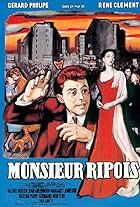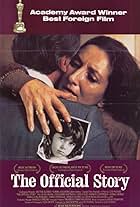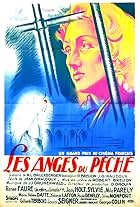Nous sommes tous des assassins
- 1952
- Tous publics
- 1h 55min
NOTE IMDb
7,2/10
436
MA NOTE
Ajouter une intrigue dans votre langueThe problem of the reasonableness of capital punishment.The problem of the reasonableness of capital punishment.The problem of the reasonableness of capital punishment.
- Réalisation
- Scénario
- Casting principal
- Nomination aux 2 BAFTA Awards
- 1 victoire et 4 nominations au total
Avis à la une
Paris under the German occupation, the slums are all around in the light city, poverty, starvation, prostitution, children without school, alcoholism, beggars and the french resistance struggling against the invaders, crimes are commited by both sides, a young illiterate french was request to do some specifics little services, killing, when the French was finally free by alies, he kills an informer, sentenced by death on the guillotine, in the prision he meets several murderers in same context, hopeful by presidential pardon all them expecting to the final hour, Cayette made a powerful criticism over death penalty, try to explains how these criminals were compelled to do such atrocities, leting us to think about it, in my teenage years l'was favourable on death sentence, but after some years l' did change my mind, no man is allowed to kill anyone, in fact if he does it in fact he stays in same position of the killer, this picture ratify my latest posture, Cayette's masterpiece!!!
Resume:
First watch: 2019 / How many: 1 / Source: DVD / Rating: 10
Resume:
First watch: 2019 / How many: 1 / Source: DVD / Rating: 10
In World War II, the illiterate, starving and alcoholic twenty years old René Le Guen (Marcel Mouloudji) fights to survive and lives with his dysfunctional family in a slum. The French Resistance invites and teaches him to kill Germans and traitors. When the war ends, he continues to kill and is arrested, judged and sentenced to death in the guillotine. While in prison waiting for a possible presidential pardon claimed by his lawyer, he meets other prisoners also waiting for the dishonored death.
"Nous Sommes Tous des Assassins" is the most impressive movie against capital sentence that I have ever seen. The lawyer André Cayatte wrote and directed this film where the defendant is actually the hypocrisy of the whole society, the church and the justice system. He does not spare the prejudgment and behavior of every social class, mostly the dominant class, to defend his opinion about the lack of humanity in the French prisons for the prisoners waiting for the executioner. In my country, we do not have capital sentence, but in my opinion this great movie is manipulative, using very sad and unfair examples to justify the position of the author. I agree that children and those that need should be assisted by the State but in spite of being fruit of the society, criminals destroy families and must pay for their crime the same way the families grieve their beloved loss. My vote is eight.
Title (Brazil): "Somos Todos Assassinos" ("We Are All Assassins")
"Nous Sommes Tous des Assassins" is the most impressive movie against capital sentence that I have ever seen. The lawyer André Cayatte wrote and directed this film where the defendant is actually the hypocrisy of the whole society, the church and the justice system. He does not spare the prejudgment and behavior of every social class, mostly the dominant class, to defend his opinion about the lack of humanity in the French prisons for the prisoners waiting for the executioner. In my country, we do not have capital sentence, but in my opinion this great movie is manipulative, using very sad and unfair examples to justify the position of the author. I agree that children and those that need should be assisted by the State but in spite of being fruit of the society, criminals destroy families and must pay for their crime the same way the families grieve their beloved loss. My vote is eight.
Title (Brazil): "Somos Todos Assassinos" ("We Are All Assassins")
Though his later color RISQUES DU METIER and LE VERDICT come close, this is the best of lawyer/film maker Cayatte's ciné-tracts, a grim, plausible and involving attack on the guillotining of prisoners. With a few digressions (AMANTS DU VERONNE, CHEMINS DE KHATMANDOU) the director devoted his career to the iniquities of the French legal system and French society reflected by it. Imagine a preachier, French Sidney Lumet.
A disparate group of prisoners lie in the condemned cell, waiting in the dark to be dragged to their execution. Only when the sun comes up do they sleep.Pellegrin is the nearest thing to a star, though Balpêtre is a familiar character face (Le COURBEAU) who was in JOURNAL D'UN CURÉ DE COMPAGNE with Claude Leydu. We get their back stories but the inhuman prison routine is far more involving.
This is a deeply disturbing film, probably the most convincing of the Cayatte collection, and it works as rather severe entertainment too. It certainly should be more widely seen. Imagine this on a double with the Yilmaz Guney film LE MUR which covers the same ground.
A disparate group of prisoners lie in the condemned cell, waiting in the dark to be dragged to their execution. Only when the sun comes up do they sleep.Pellegrin is the nearest thing to a star, though Balpêtre is a familiar character face (Le COURBEAU) who was in JOURNAL D'UN CURÉ DE COMPAGNE with Claude Leydu. We get their back stories but the inhuman prison routine is far more involving.
This is a deeply disturbing film, probably the most convincing of the Cayatte collection, and it works as rather severe entertainment too. It certainly should be more widely seen. Imagine this on a double with the Yilmaz Guney film LE MUR which covers the same ground.
Legal restraints having prevented him from filming the infamous Seznec Affair, André Cayatte has turned his attention to the institutionalised barbarity of death by guillotine in which he also points an accusatory finger at social inequality and collective responsibility.
The four murderers awaiting execution here are all based on characters who had crossed Cayatte's path whilst he was practising law and although for filmic purposes the fate of Le Guen is left in the balance, his character was in fact pardoned.
Cayatte and dialogue writer Charles Spaak have ensured a brutal and harrowing depiction with more than its fair share of sermonising to present a powerfully persuasive case for the abolition of the death penalty, aided immeasurably by committed performances from an excellent cast, especially the condemned who are presented as hapless victims of circumstance and temperament whose crimes would not have been prevented by the supposed 'deterrent' of capital punishment.
Although the film no doubt raised public awareness at the time, Madame la Guillotine was not to be banished for another thirty years.
Interestingly, the British release title turned Cayatte's statement into a question.
The four murderers awaiting execution here are all based on characters who had crossed Cayatte's path whilst he was practising law and although for filmic purposes the fate of Le Guen is left in the balance, his character was in fact pardoned.
Cayatte and dialogue writer Charles Spaak have ensured a brutal and harrowing depiction with more than its fair share of sermonising to present a powerfully persuasive case for the abolition of the death penalty, aided immeasurably by committed performances from an excellent cast, especially the condemned who are presented as hapless victims of circumstance and temperament whose crimes would not have been prevented by the supposed 'deterrent' of capital punishment.
Although the film no doubt raised public awareness at the time, Madame la Guillotine was not to be banished for another thirty years.
Interestingly, the British release title turned Cayatte's statement into a question.
That was the second film dealing with justice in France in Cayatte's long career (1942-1978).François Truffaut was always putting him down,but won't you forget ,for a while,the new wavelet and their notorious fusty Cahiers du Cinema ?Cayatte is a name to be reckoned with.
If Richard Pottier("Meurtres" ) tackled euthanasia the same year (1950) as he did ("Justice est Faite")Cayatte was the first in France (and in the world?) to devote an entire film to express his disgust of death penalty.Think of it! It was 1952!It took a lot of guts and a lot of faith to dare such a thing at a time when lex talionis and punishing the criminal as a deterrent to others were the golden rules."What example?" the doctors says "the executions were no longer public as if they were ashamed of what they did"
The first part of the movie may seem weak by today's standards .But it's necessary to introduce René (a never better Marcel Mouloudji)and his background.In his own particular way,he predates Malle's "Lacombe Lucien" hero .One fights for the Resistance,and the other is a collaborator.But both are ignorant poor -René is even illiterate .René lives in a place where "dump" is too beautiful a word.His mother is a shrew who has always had one too many;his sister has been a whore since she was twelve ;his little brother is bound to be a delinquent. Another man sentenced to death has killed his baby girl: but he was exhausted after a hard day of work and as he couldn't sleep because his daughter was crying in their tiny flat he lost his mind.Not a judge can comprehend.Only a woman in a cafe knows better:if that man had been decently housed -just have a look at the lawyer's bourgeois parents' luxury house ,where's there's a "golden dish with every wish"- nothing would have happened cause that depressed man was a good father.
Cayatte puts the whole society on trial,particularly the bourgeois (the lawyer's father just looks up and pretends that he does not see when his son brings the little brother home)In his next movie,"Avant le Deluge" which is to be recommended ,Cayatte would denounce the bourgeois who do not know of the meaning of the word "responsibility".
By its second part ,the movie becomes almost unbearable,even today.Cayatte wanted his movie to be so.Nothing is spared the viewer: the condemned persons cell,where in the small hours they suddenly become frightened :is this dawn THE dawn?Will THEY come?Is IT in the prison? ( the word "guillotine " is never uttered ).Cayatte's directing becomes masterful when he depicts the corridor where a secret ceremony happens early early in the morning.Those men in grey suddenly enter the room and sweetly say "it's your turn ,son!arm up with courage!"
As often in Cayatte's work ,the screenplay is a bit muddled (the Corse episode is a bit too much,but at least it allows us to see great actress Madame Sylvie in two too brief scenes)but until the very end his "hope against hope" will not leave him down.As the lawyer waits for an eventual President's pardon for René ,there's a moving tracking in on his little brother's face .Cayatte does not want to comfort his audience,and this conclusion is the best he could think of.
Time has passed.In 1981,François Mitterrand abolished death penalty in France.One should never forget that men like Cayatte helped along the way .His movie was certainly as important as any of Godard's farces.
Like this?try these....
I want to live (Robert Wise,1958)
La vie,l'amour ,la mort (Claude Lelouch,1969)
Deux hommes dans la ville (Jose Giovanni,1972)
Le pullover rouge (Michel Drach,1979)
Dead man walking (Tim Robbins ,1996)
If Richard Pottier("Meurtres" ) tackled euthanasia the same year (1950) as he did ("Justice est Faite")Cayatte was the first in France (and in the world?) to devote an entire film to express his disgust of death penalty.Think of it! It was 1952!It took a lot of guts and a lot of faith to dare such a thing at a time when lex talionis and punishing the criminal as a deterrent to others were the golden rules."What example?" the doctors says "the executions were no longer public as if they were ashamed of what they did"
The first part of the movie may seem weak by today's standards .But it's necessary to introduce René (a never better Marcel Mouloudji)and his background.In his own particular way,he predates Malle's "Lacombe Lucien" hero .One fights for the Resistance,and the other is a collaborator.But both are ignorant poor -René is even illiterate .René lives in a place where "dump" is too beautiful a word.His mother is a shrew who has always had one too many;his sister has been a whore since she was twelve ;his little brother is bound to be a delinquent. Another man sentenced to death has killed his baby girl: but he was exhausted after a hard day of work and as he couldn't sleep because his daughter was crying in their tiny flat he lost his mind.Not a judge can comprehend.Only a woman in a cafe knows better:if that man had been decently housed -just have a look at the lawyer's bourgeois parents' luxury house ,where's there's a "golden dish with every wish"- nothing would have happened cause that depressed man was a good father.
Cayatte puts the whole society on trial,particularly the bourgeois (the lawyer's father just looks up and pretends that he does not see when his son brings the little brother home)In his next movie,"Avant le Deluge" which is to be recommended ,Cayatte would denounce the bourgeois who do not know of the meaning of the word "responsibility".
By its second part ,the movie becomes almost unbearable,even today.Cayatte wanted his movie to be so.Nothing is spared the viewer: the condemned persons cell,where in the small hours they suddenly become frightened :is this dawn THE dawn?Will THEY come?Is IT in the prison? ( the word "guillotine " is never uttered ).Cayatte's directing becomes masterful when he depicts the corridor where a secret ceremony happens early early in the morning.Those men in grey suddenly enter the room and sweetly say "it's your turn ,son!arm up with courage!"
As often in Cayatte's work ,the screenplay is a bit muddled (the Corse episode is a bit too much,but at least it allows us to see great actress Madame Sylvie in two too brief scenes)but until the very end his "hope against hope" will not leave him down.As the lawyer waits for an eventual President's pardon for René ,there's a moving tracking in on his little brother's face .Cayatte does not want to comfort his audience,and this conclusion is the best he could think of.
Time has passed.In 1981,François Mitterrand abolished death penalty in France.One should never forget that men like Cayatte helped along the way .His movie was certainly as important as any of Godard's farces.
Like this?try these....
I want to live (Robert Wise,1958)
La vie,l'amour ,la mort (Claude Lelouch,1969)
Deux hommes dans la ville (Jose Giovanni,1972)
Le pullover rouge (Michel Drach,1979)
Dead man walking (Tim Robbins ,1996)
Histoire
Le saviez-vous
- AnecdotesFinal film of Alinda Kristensen.
- ConnexionsReferenced in Cosmos (2015)
Meilleurs choix
Connectez-vous pour évaluer et suivre la liste de favoris afin de recevoir des recommandations personnalisées
Détails
- Date de sortie
- Pays d’origine
- Langue
- Aussi connu sous le nom de
- We Are All Murderers
- Lieux de tournage
- Sociétés de production
- Voir plus de crédits d'entreprise sur IMDbPro
- Durée1 heure 55 minutes
- Couleur
- Rapport de forme
- 1.37 : 1
Contribuer à cette page
Suggérer une modification ou ajouter du contenu manquant

Lacune principale
By what name was Nous sommes tous des assassins (1952) officially released in Canada in English?
Répondre































